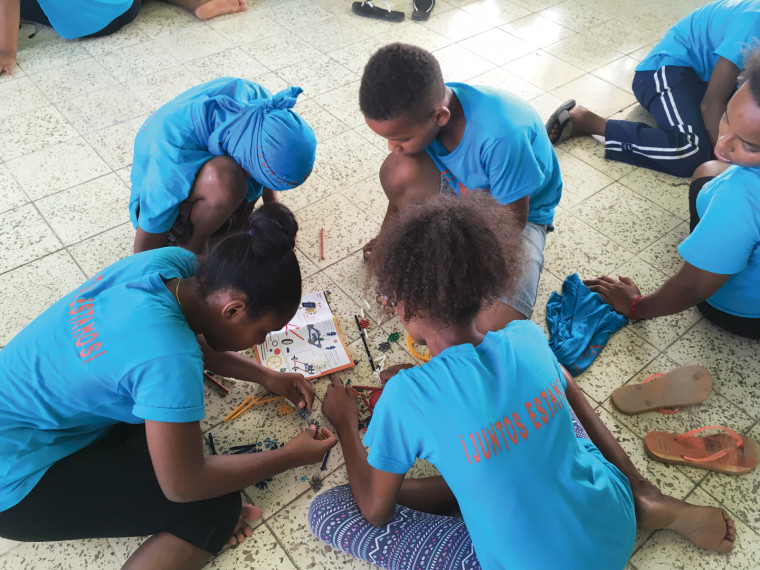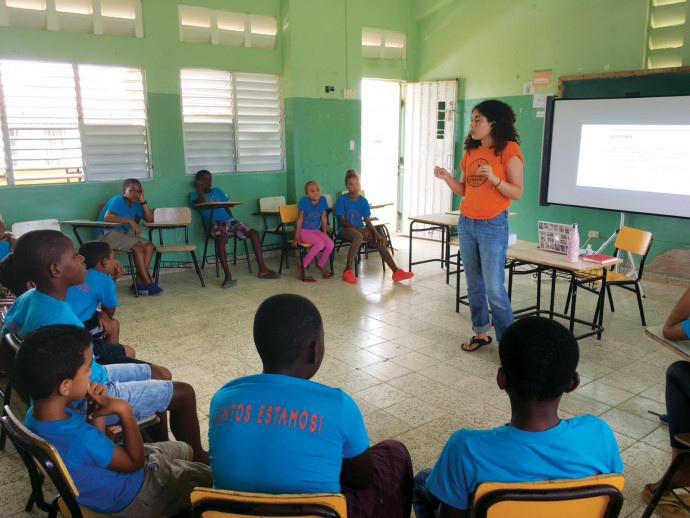Caribbean Project for Peace
Open gallery

A mix of Dominican and Haitian students hold up their colorful, hand-built models with pride.
Using kits that function like advanced Legos, they had created working solar-, wind-, and water-powered devices to dazzle their families at their school’s Parents Night. Samantha Hernandez BA ’21 stands nearby, observing her students’ excitement as they share their accomplishments with parents.
Hernandez launched her project last summer in the Dominican Republic after receiving a $10,000 grant from 100 Projects for Peace, an organization that encourages undergraduates to identify the root causes of global conflict and propose creative, unique responses. Hernandez developed her project to focus on the intersection of climate change and racial discrimination, which she believes threatens the potential for peace and stability.
Because of the Dominican Republic’s location in the Caribbean, its people and land will be heavily impacted by the inevitable consequences of climate change. Hernandez’s parents are from the Dominican Republic, so she was inspired to address the environmental problems she had noticed during her time there as a child. “I wanted to do something to help my home country,” she says.

As an environmental studies major at Lewis & Clark, Hernandez has extensive knowledge of renewable energy. She decided to use K’NEX renewable energy sets to help students understand the mechanisms of different renewable energy machines or systems in a hands-on way. This approach also provided a welcome contrast to the school’s usual emphasis on memorization.
Because Hernandez’s view of the environment encompasses numerous elements, including the relationships between different racial groups, she wanted her project to address the ways in which discrimination functions in conjunction with other environmental concerns. “Discrimination is really upsetting to me because it is impeding action,” she says. Most discrimination taking place in the Dominican Republic is rooted in disputes over Haitian immigration, particularly after the devastating 2010 earthquake. By using environmental education as a mechanism to foster a relationship between Haitian and Dominican children, she was able to make progress in the classroom by bringing all of the children together to work toward a common goal.
Hernandez says her experience reinforced her enthusiasm about pursuing a degree in environmental studies. She aspires to write her senior thesis about the impacts of environmental racism and the role that U.N. aid can play in areas impacted by this issue.
—by Zoey Steel BA ’20
More L&C Magazine Stories
Lewis & Clark Magazine is located in McAfee on the Undergraduate Campus.
MSC: 19
email magazine@lclark.edu
voice 503-768-7970
fax 503-768-7969
The L&C Magazine staff welcomes letters and emails from readers about topics covered in the magazine. Correspondence must include your name and location and may be edited.
Lewis & Clark Magazine
Lewis & Clark
615 S. Palatine Hill Road MSC 19
Portland OR 97219

